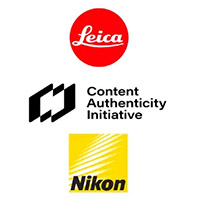Adobe’s Content Authenticity Initiative partners with Leica and Nikon to provide credentials in-camera at time of capture
posted Friday, October 21, 2022 at 3:30 PM EST

Alongside major updates to its photo editing software, Adobe also announced a new partnership between its Content Authenticity Initiative (CAI), Leica and Nikon.
Before diving into the specifics of the new agreement, let's briefly discuss the Content Authenticity Initiative. Three years ago at Adobe MAX, CAI was launched to increase transparency, build trust and fight against misinformation. CAI is built around provenance technology to enable attribution for creators and provide viewers with information about the origin of an image and how it's been altered. This task becomes increasingly important given the advancement of generative AI technology like DALL-E when it's becoming harder to tell if something is original content or if it's been created by a computer. Ultimately, CAI is about restoring trust in a digital content ecosystem.
At this week's Adobe MAX, Adobe announced partnerships with Leica and Nikon to implement provenance technology at the camera level, including within Leica's iconic M11 rangefinder and Nikon's flagship Z9 mirrorless camera. Adobe writes, "This is a major step in establishing trust and attribution across the content lifecycle — as this is the first time this secure-capture technology will be in the hands of the creative community. It will allow photojournalists and other creators to protect and increase transparency in their digital work by securely attaching valuable cryptographic information, such as authorship and when, where, and how an image was captured."
Alongside the news, Adobe has activated the Coalition for Content Provenance and Authenticity (C2PA) technical standard. This is the first time full C2PA specs have been realized in a camera. With Adobe's free, open-source CAI tools, adoption continues to grow among photojournalists, news outlets, creative professionals, consumers, social media influences, artists, and more.

On its relationship with Leica, Adobe writes, "For over a century, the Leica brand name has been synonymous with authentic images and cameras that have produced countless iconic photographs. Leica’s existing membership in the CAI, and today’s extended partnership, are broadening CAI’s reach to even more creative professionals and artists. The Leica innovation and development team recently implemented the C2PA standard in a Leica M11 Rangefinder camera to demonstrate the new provenance technology for the first time. Each image is provided with a forgery-proof signature that documents essential information, such as camera model, manufacturer and image content. This ensures an unbroken chain of authenticity from capture to completion. The first available Leica cameras with the C2PA standard are planned to ship in 2023."
For Nikon, Adobe adds, "Nikon sits at the forefront of innovative technology. To build on its role as the first camera manufacturer to join the CAI and C2PA, it will exhibit the Nikon Z9 specially equipped with its image provenance function, which conforms to C2PA standards and was developed in collaboration with the CAI. Nikon leveraged the CAI’s open-source toolkit to implement this provenance function, which is significant as the CAI seeks to empower broader developer and partner adoption across diverse workflows and tools. Nikon is developing the C2PA provenance functionality for a future camera model."
The CAI and C2PA specs are critically important for professional creators. The standards and new in-camera technology help ensure that creators are always attributed for their work and maintain clear, verifiable ownership over their images. Further, the standards also help consumers understand more about what they're looking at. It's important that people be able to trust what they see. For more information, visit the Content Authenticity Initiative website.